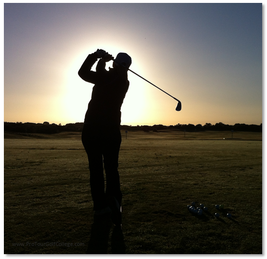 We’ve been following the performances of a number of young male and female tour professionals on a number of minor and major golf tours around the world over the past couple of years because we have a genuine interest in seeing them do well, moving ever closer to their major goals. However we’ve been somewhat bewildered of late with some of the comments of these players on social media (who are struggling to make cuts and make ends meet) about how they are going about improving their game. Their approach to golf improvement raises some red flags with us. When your scores are higher than they should be, and your missing cut after cut, working on major swing changes mid-season with your golf instructor might seem like a good idea, but in our experience it isn't. The thing is, many of these young professionals are certainly producing some good rounds in tournaments, but these are being offset by too many bad ones. Too Much C Game and Not Enough A Game The bottom line is that their C Game days (high score average) are outweighing their A Game days (low score average), thus keeping their seasonal score average higher--leading too many missed cuts over a season, and too much month at the end of their money. Golf is a very expensive game to play at the professional tour level, with loads of expenses before you even tee it up. So a tour golfer who does not fully understand how to improve their game when they are on the road, without relying fully on someone else’s expertise is setting themselves up for failure. Many of these young golfers are becoming too reliant on ‘experts’ without fully developing the knowledge, instincts and self-efficacy to help themselves play better on their own terms—especially when the chips are down. Your Self-Efficacy Beliefs The famous Stanford Psychologist Albert Bandura defines self-efficacy as someone’s belief in their ability to succeed in specific situations, or accomplish a specific task. Basically your self-efficacy beliefs determine how you feel, think, motivate or drive yourself, and how you behave. Source: https://www.uky.edu/~eushe2/Bandura/BanEncy.html Your sense of self-efficacy plays a major role in the type of goals you set for yourself, the way you practice golf skills, and the way you play in tournaments. If you have high self-efficacy you will tend to have more “can do” in your attitude, and this helps you to persist and succeed when practicing the ‘boring but important skills, and to spend more time on the practice fairway searching for ways to get better than other golfers will. Basically you become more self-reliant and determined to make progress on your own terms. 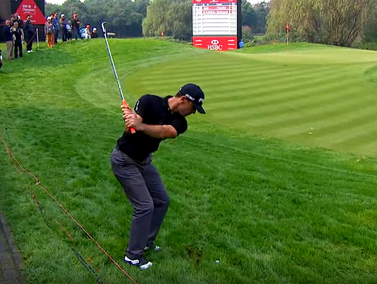 You Need a Can Do Attitude When Facing Trouble Shots You Need a Can Do Attitude When Facing Trouble Shots Self-Efficacy is Your Can Do Ability So self-efficacy affects every area of your golfing life because it adjusts your beliefs to influence situations confronting you. It also strongly impacts your competence and confidence to exercise your skills when facing challenging times on the golf course. Not to mention that it can affect the choices you make at critical times. An example of high self-efficacy would be that you have the capability to produce good scores and be very competitive in tournaments when everything is going well for you (A Game days). On the other hand, you may not possess a matching set of beliefs and skill sets--a low self-efficacy when your game is not going the way you expect it to (C Game days). This supports our findings that many young amateur by being too reliant on others for inspiration (when things are not going the way they planned), are not developing the necessary high self-efficacy they need when they are playing poorly. They appear to have well developed high A game self-efficacy, but much lower B and C game self-efficacy. In our experience this appears to be a contributing factor separating them from successful professional golfers playing on the same tour. Yes, you most certainly need the expertise of your coaches and trainers to guide you and your game, however you also need to build a strong belief in yourself—especially when you are faced with the tough times you will continually face on the golf course. Your ability to turn bad rounds (C game days) into B or A game days is the master skill to develop as a professional golfer if you wish to have a long and successful career. 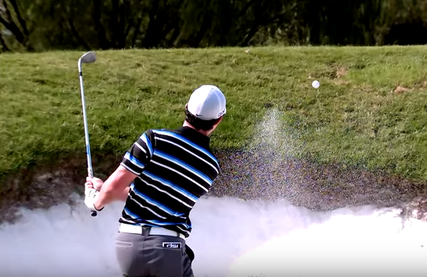 Rory McIlroy Executing a High Pay-Off Skill to Keep Bad Scores off the Card Rory McIlroy Executing a High Pay-Off Skill to Keep Bad Scores off the Card Building Practice Mastery Experience The most effective way for you build a better C and B Game and develop high self-efficacy on the golf course, is by building Practice Mastery Experience into your high pay-off skills. High pay-off skills are the skills you need and rely on when you are having a tough day on the golf course. These are the skills that help you turn bad scores into better ones. What Are Your High Pay-Off Golf Skills? You need to identify the high pay-off golf skills in your game. These important skills will have the most positive effect on lowering your competitive score average by maintaining score flow on your tough days. In Practice Mastery Experience process you build a mountain of mini successes by planning and setting up realistic and relevant practice situations and simulations that rival the types of challenging situations you face on the golf course—particularly on your C game days. The idea here is that you set up practice scenarios (on the range and on the golf course) where you can only achieve good results by playing excellent shots from challenging situations. You will build a strong belief system and set of skills to ably manage the inevitable mis timed and loose golf shots you will hit, thus encouraging growth of high self-efficacy. 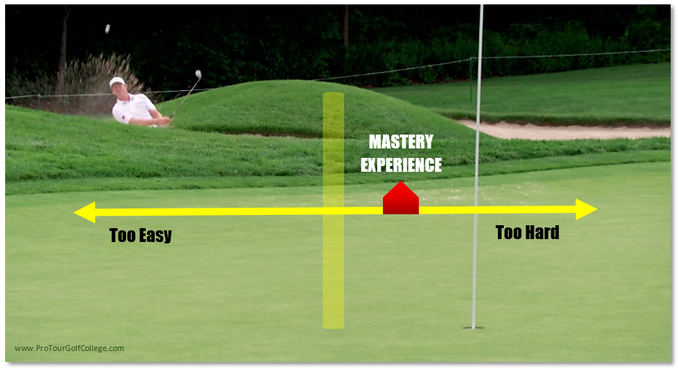 Practice That's Too Hard On the flip side, if you are someone who sets up your practice situations and simulations way too hard and unrealistically, leading to too much failure experience, then understand that this will weaken and undermine the growth of your self-efficacy. Note: This is especially true if these failure experiences occur before your self-efficacy is firmly established in your teenage years. Practice That's Too Easy Consider also that setting up easy practice simulations that lead to easy success can result in an attitude of expecting quick and easy success when you practice. If you only experience easy success in practice, then you will find yourself easily discouraged on the golf course when you fail to transfer your opportunities into expected outcomes. Practice That's Just Right This is why it is vitally important to design your practice sessions with practice routines that challenge you and stretch your high pay-off skill sets, whilst at the same time not breaking them and undermining your confidence. When you practice your high pay-off skill sets you walk a fine line between creating practice scenarios that are either too hard to achieve or too easy. Just remember to stay on the hard side of the line, where it's challenging but not impossible. A good rule of thumb is your results should generate practice scores of between 20 and 50 percent. The idea here is to practice the high pay-off skills until they get to between 50 and 70 percent, and then make them harder so they return to the 20 to 50 percent range. Then repeat the same process. This approach to practice will help you to develop a resilient and robust self-efficacy which is essential for playing the game at professional level. Developing grit and determination to dig deep during difficult rounds and turn potentially bad scores into good scores requires the ability to produce shots that result in making more pars than bogeys and worse. By practicing in ways that encourage you to be more resilient when you are challenged, you will turn bad events into better ones more often. 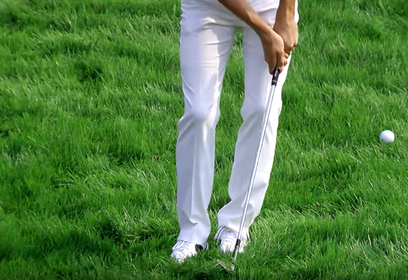 Practicing the Tough Shots Makes You Tougher and Develops High Self-Efficacy Practicing the Tough Shots Makes You Tougher and Develops High Self-Efficacy Lessons to Learn We know that set-backs are par for the course in golf—especially in professional golf. However there are always lessons that you can learn, and these lessons serve a useful purpose. Success on the golf course only comes from sustained effort, skillful execution of high pay-off skills, and a flexible attitude to set-backs. This is where a well-developed self-efficacy through well designed practice scenarios will lead you to bounce-back more often, thereby assisting you in maintaining your score flow. When you become convinced you have what it takes to succeed, and you do it on your own terms—not someone else’s, you will not only persevere in the face of adversity, you will thrive in it, quickly rebound from your setbacks, and turn C game days into A game days much more often. Lawrie Montague and David Milne - Pro Tour Golf College The Professional Golf Tour Training College for Serious Amateur Golfers Comments are closed.
|
Archives
June 2019
|
Proudly Supported By
Copyright © 2011 - 2018 Pro Tour Golf College
Website Managed By Golf Performance Media
All Rights Reserved
Website Managed By Golf Performance Media
All Rights Reserved

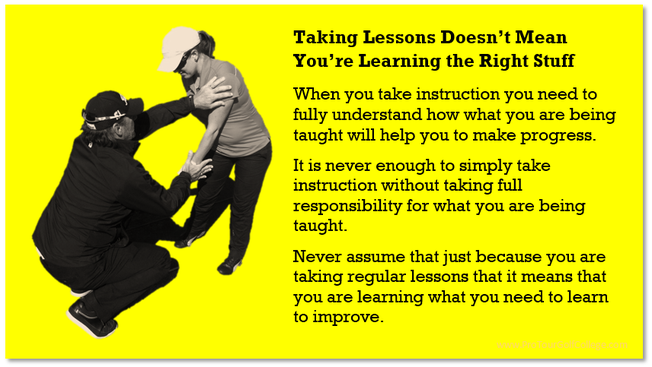
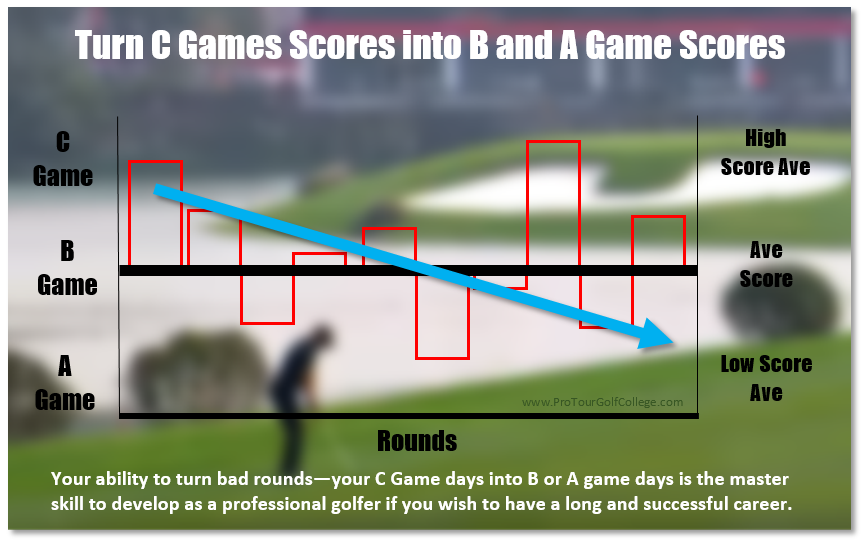

 RSS Feed
RSS Feed



